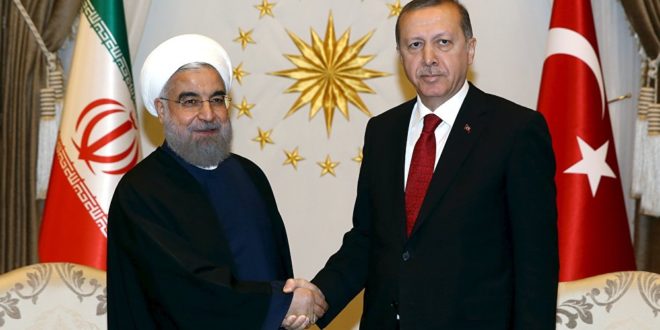Shehab Al-Makahleh
Political instability in the Middle East has driven some countries to rethink their strategic relations with other countries.
Few days ago, Turkish President Recep Tayyip Erdogan paid an official visit to Iran, his regional rival, and in a joint press conference with his Iranian counterpart Hassan Rohani said: “Turkey, Iran and Iraq would work together to ensure that political boundaries of the region would not change by any means”.
The next day, an Iraqi Foreign Ministry spokesman said that Baghdad had officially informed Ankara and Tehran to issue orders for their forces to enter Iraqi borders and to cease all trade deals with Kurds, who conducted their referendum for secession last month, which resulted in a vote that favoured independence from Iraq.
Unseemly alliances
The sense of unease in Iraq is so heightened that Baghdad is moving to Ankara and Tehran to apply more pressure on Kurds. It is strange for Iran, Iraq and Turkey to find common cause when Turkey and Iraq have had several political issues with each other in recent years.
In 2015, the two countries were engaged in protracted diplomatic spat over deployment of Turkish troops inside Iraq without the approval of the Baghdad government.
It is also strange that Turkey and Iran have become partners. Though there is no stated enmity between Tehran and Ankara, both seek regional domination in the Middle East and have conflicting longstanding interests.
For instance, both support rival groups in the Syrian war. Turkey has long opposed Syrian government including al-Assad and has managed to support opposition factions. In contrast, Iran has long been a supporter of Al-Assad, fighting against those who counter the Syrian army by forming coalitions with countries and armed groups to pave the way for Tehran to reach the Mediterranean Sea.
Meanwhile, the Iraq-Iran relationship sounds more complex than the one between Iraq and Turkey, simply because Tehran has a close Shiite connection with Baghdad since the coup d’état against former Iraqi President Saddam Hussein.
On the other hand, there is a deeply entrenched level of antagonism between Arabs and Persians, which has extended for many years. This justifies the reason Baghdad was looking for rapprochement with Riyadh after relations between the two were severed in 1990 following Iraq’s annexation of Kuwait.
Saudi-Iraq rapprochement
Last August, Muqtada al-Sadr paid a visit to Jeddah on the invitation from HRH Crown Prince Mohammad bin Salman to forge better relations between Iraq and Saudi Arabia. Surprisingly Iraq, once a major regional power, has become very weak in the wake of sectarian conflict which has torn the country apart due to continued interventions from Iran.
Turkey’s main issue with the recent referendum in Kurdistan is that allowing Iraqi Kurds to declare independence could set a precedent for the whole Middle East region. The same applies for Iran which is facing two major threats.
The first is the American threats to pull out of the nuclear deal, which would lead to further economic sanctions on Iran and the second is the Kurdish threat which would be fatal if Kurds in Iran aspire for another referendum.
Turkey and Iran: Allies against the US
Though Iran-Turkey relations may be impermanent, both countries will try to reshape the balance of power in the Middle East at a time when the power of the US is in decline, while Russian presence is increasing. The Turkish and Iranian cooperation is quite apparent as both are seeking to revive their respective Ottoman and Persian empires at the expense of Arabs.
The questions that arises is: Will such an alliance or partnership between Iran and Turkey last? Such an alliance cannot last and survive in the long term because it is based on short-term common interests. Turkey is currently taking preventive measures against the Kurds in Syria whom the US is supporting, while Iran is seeking to forestall any Kurd movement in its territory or in any neighboring country.
In other words, neither Ankara nor Tehran is ready to deal with a Kurdish secessionist movement. Iran is now under pressure from US President Donald Trump who has announced he will review the nuclear deal with Iran, amidst expectations that he will say that Tehran does not fulfil its obligations.
In recent weeks, President Trump has appeared to be impatiently racing toward war with his Iran-phobic statements at the United Nations General Assembly when he blamed Tehran for the chaos in the Middle East.
The question that would be difficult to answer is that whether a war on Iran is in the offing or if Americans decided to militarily intervene against Iran, what will be the repercussions on the Middle East region?
It is well-known that Washington always promotes its interests when dealing with the Middle East. Will it allow Israel to act or conduct air strikes against Iran from bases within Kurdistan of Iraq, where there are already some Israeli forces? Such a confrontation between the US and Israel on one hand and Iran on the other may alter the face of the Middle East, the alliances and hostilities.
Nowadays, Washington feels that depending on the execution of its security and political agendas in the Middle East is no longer sufficient to achieve the sought-after changes in the region.
This explains why the US is seeking to counter any threats that it might face by changing the regional dynamic. The common denominator now between Iran and Turkey vis-à-vis the US is that both are now considered inimical and opposed to American policies.
________________________
Shehab Al-Makahleh is Director of Geostrategic Media Center, senior media and political analyst in the Middle East, adviser to many international consultancies. He can be reached at: @shehabmakahleh and @Geostrat_ME.
Source: Al-Arabiya
 Geostrategic Media Political Commentary, Analysis, Security, Defense
Geostrategic Media Political Commentary, Analysis, Security, Defense





